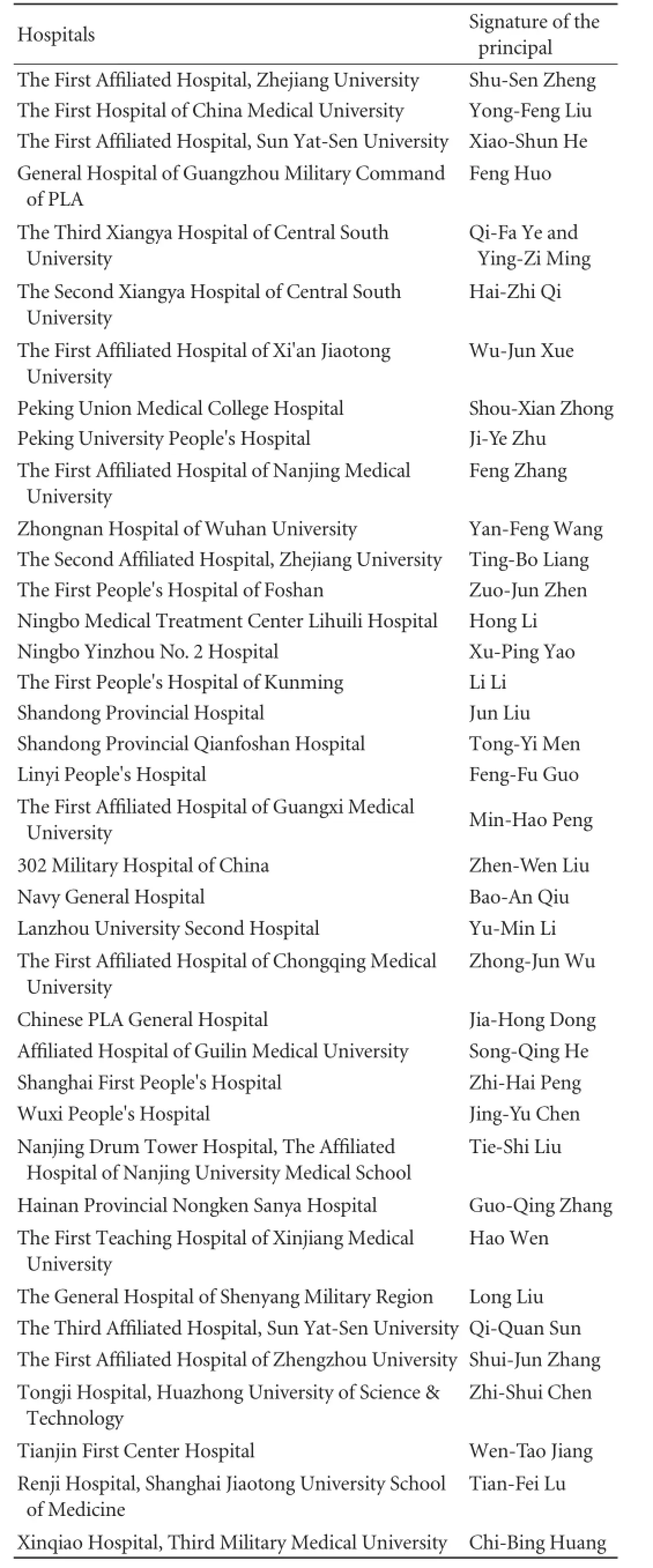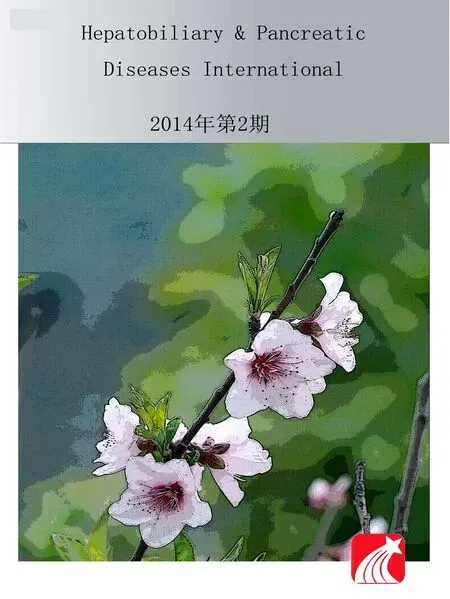China organ donation and transplantation update: the Hangzhou Resolution
Jie-Fu Huang, Shu-Sen Zheng, Yong-Feng Liu, Hai-Bo Wang, Jeremy Chapman, Philip O'Connell, Michael Millis, John Fung and Francis Delmonico
Beijing, China
China organ donation and transplantation update: the Hangzhou Resolution
Jie-Fu Huang, Shu-Sen Zheng, Yong-Feng Liu, Hai-Bo Wang, Jeremy Chapman, Philip O'Connell, Michael Millis, John Fung and Francis Delmonico
Beijing, China
The much-anticipated change in the practice of organ donation and transplantation in China is now underway and affirmed by an important Hangzhou Resolution promulgated at the 2013 China Transplant Congress.
Support of the National Health and Family Planning Commission
On October 29, 2013, in a meeting of the National Health and Family Planning Commission (NHFPC), officials with Jie-Fu Huang, Head of National Organ Transplant Committee (OTC), Hai-Bo Wang, Director of China Organ Transplant Response System (COTRS) Research Center, Francis Delmonico, President of the Transplantation Society, USA, and Bin Li, Minister of the NHFPC presented a new five-point plan for organ donation and transplantation under the authority of the NHFPC:
i) Human organ donation system:
The human organ donation system, led by the NHFPC and involved by the Red Cross Society of China, aims to promote the organ donation campaign throughout the nation.
ii) Human organ procurement and allocation system:
The practice of human organ procurement and allocation will be "open and transparent" by an executive order "The Human Organ Procurement and Allocation (Interim)" released from the NHFPC in August 2013 that requires: a) Transparency in the allocation of organs to a national computerized waitlist (COTRS); b) The development of the organ procurement organization structure in each province; c) The training of organ donation coordinators.
This regulation of the NHFPC is aligned to the State Council directive that mandates transparency and fairness in the practice of organ transplantation in China.
The NHFPC further emphasizes that the recent mandatory implementation of an information technology system (COTRS) accomplishes a transparent and fair practice of the allocation of deceased donor organs in China.
iii) Human organ transplant clinical service system:
One hundred and sixty-nine transplant centers are authorized to provide transplant service in China.
iv) Scientific registry system for human organ transplantation:
The scientific registry systems for the transplantation of the liver, kidney, heart, lung, intestine and pancreas file each case of organ transplantation in China with appropriate follow-up of the recipients.
v) Human organ transplant regulatory system:
A regulatory authority of the NHFPC supervises the practice of organ donation and transplantation in Chinaaccording to more than 30 existing laws and regulations developed by the State Council and the NHFPC of China since 2007.
At the time of the meeting, 1161 deceased organ donors (not involving the use of organs from executed prisoners) had been recorded and more than 3175 organ transplants performed. The deceased and living donor transplants constituted 49.4% of organ transplantations in China in 2013.
The NHFPC expressed the resolution of the government of China that the dependence upon organs from executed prisoners must be terminated. The government of China has affirmed its commitment to prohibit transplant tourism and to shut down organ trafficking and transplant commercialism.
NHFPC will hold a joint meeting of the international transplant community in China with the participation of the World Health Organization (WHO) in 2014. The agenda and involvement of the WHO and The Transplant Society (TTS), and the request of TTS to major international organizations to participate in this proposed meeting will be dependent upon the fulfillment of the five-point NHFPC program and the cessation of organs being recovered from executed prisoners.
The Hangzhou Resolution
The five-point plan as elaborated by the NHFPC was then formally endorsed by 12th National OTC meeting and promulgated at the 2013 Chinese Transplant Congress in Hangzhou on November 1-2, 2013 while releasing the Hangzhou Resolution as a commitment of the NHFPC to align practices of organ donation and transplantation in China with WHO Guiding Principles and the Declaration of Istanbul, and subsequently adopted by the World Health Assembly.[1]
The Resolution requires all organ transplant hospitals to strictly comply with the "Regulation on Human Organ Procurement and Allocation (Interim)" that was proposed by the NHFPC on August 15, 2013 to ensure that the source of the organs for transplantation meets the universally accepted ethical standards. The organ donation process must strictly follow the national standard protocol. We have three Chinese categories of deceased organ donation: 1) Category I (C-I): organ donation after brain death; 2) Category II (C-II): organ donation after cardiac death; 3) Category III (C-III): organ donation after brain death followed by cardiac death.[2]
The Organ Procurement Organization (OPO) and professional teams of human organ donation coordinators must be established. The regulationmandates the use of COTRS to ensure the fairness, justice and transparency of organ procurement and organ allocation. The Red Cross Society of China should be fully utilized to safeguard the sensible, legitimate humanitarian and high-quality organ transplant services for Chinese people in the process of organ donation and transplantation.

Table.List of hospitals committed to immediately terminate the use of organs from executed prisoners
China needs the support of the international community to implement this new system and the international community needs the involvement of China in progress of organ transplantation. As of this mutual interaction, Bin Li, Minister of the NHFPC pledged her commitment to bring China back to the international community and to promote an academic exchange based upon the five-point NHFPC plan elaborated.
The Hangzhou Resolution excludes the dependence of transplant centers on the use of organs from executed prisoners. It calls for a commitment of transplants centers to ensure that the source of organs is in compliance with international ethical standards.
Immediately after the presentation of the Resolution on November 2, 2013, led by Professor Shu-Sen Zheng, the president of Chinese Society of Organ Transplantation and Professor Yong-Feng Liu, the president-elect of Chinese Society of Organ Transplantation, the leaders of 38 transplant centers voluntarily made a written commitment to the cessation of organs from executed prisoners (Table). More hospitals are anticipated in the days ahead.
Next steps
With the release of the Hangzhou Resolution and the engagement of those centers committed to no longer use organs from executed prisoners, TTS and the Declaration of Istanbul Custodian Group will work with foundation support from within China to accomplish the widespread implementation of the NHFPC plan throughout all the provinces of China involved in organ transplantation.
A meeting is planned in Beijing in 2014. The executive leaders of the major international societies and the WHO will be invited. The meeting will affirm the new resolution in the practice of organ donation and transplantation in China. The meeting will be a milestone for China transplant professionals to practice according to the international standards set by WHO Guiding Principles and the Declaration of Istanbul, and therefore the data from the China transplant registries will be polled to those of major international organizations. The experience of those Chinese transplant professionals who have committed themselves to the Hangzhou Resolution will be shared.
Organ transplantation professionals realized that the development of a mature and ethical organ donation and transplantation system will be an arduous journey with numerous difficulties and challenges. However, the need of the Chinese people for high-quality organ transplant services is our obligatory mission.
Contributors:All authors contributed to the drafting and critical revision of the manuscript. HJF and WHB contributed to the drafting and critical revision of the manuscript. All authors contributed to the coordination and the signing of the hospital list. HJF is the guarantor.
Funding:The Peking Union Medical College has received grant support from the China Medical Board for the time, meetings, and travel associated with the work described in this manuscript.
Ethical approval:Not needed.
Competing interest:No benefits in any form have been received or will be received from a commercial party related directly or indirectly to the subject of this article.
1 Editorial Office. OTC Hangzhou Resolution. Hepatobiliary Surg Nutr 2013;2:317-318.
2 Chinese Society of Organ Transplantation, Chinese Medical Association. National guidelines for donation after cardiac death in China. Hepatobiliary Pancreat Dis Int 2013;12:234-238.
Received January 17, 2014
Accepted after revision February 28, 2014
Author Affiliations: Department of Liver Surgery, Peking Union Medical College Hospital; National Organ Transplant Committee, Ministry of Health, Beijing 100000, China (Huang JF); The First Affiliated Hospital of Zhejiang University, Hangzhou 310003, China (Zheng SS); The First Hospital of China Medical University, Shenyang 110001, China (Liu YF); Department of Surgery, The University of Hong Kong, Pokfulam, Hong Kong; China Organ Transplant Response System Research Center, Shenzhen 518000, China (Wang HB); Centre for Renal and Transplant Research, Westmead Millenium Institute, Sydney University, Sydney, Australia (Chapman J and O'Connell P); Section of Transplantation, Liver Transplantation and Hepatobiliary Surgery, University of Chicago, Chicago, IL, USA (Millis M); Department of General Surgery, Transplant Center, Digestive Disease Institute, Cleveland Clinic, Cleveland, OH, USA (Fung J) and Department of Surgery, Massachusetts General Hospital, Boston, MA, USA (Delmonico F)
Jie-Fu Huang, MD, Vice Minister, Ministry of Health,1 Xizhimen Wai Nan Road, Beijing 100044, China (Tel: 86-10-68792902; Email: zhaohtmoh@126.com)
? 2014, Hepatobiliary Pancreat Dis Int. All rights reserved.
10.1016/S1499-3872(14)60022-9
 Hepatobiliary & Pancreatic Diseases International2014年2期
Hepatobiliary & Pancreatic Diseases International2014年2期
- Hepatobiliary & Pancreatic Diseases International的其它文章
- Pancreatic fistula after central pancreatectomy: case series and review of the literature
- FBW7 increases chemosensitivity in hepatocellular carcinoma cells through suppression of epithelialmesenchymal transition
- Pancreatic head cancer in patients with chronic pancreatitis
- Multi-visceral resection of locally advanced extra-pancreatic carcinoma
- Instrumental detection of cystic duct stones during laparoscopic cholecystectomy
- Improved anterior hepatic transection for isolated hepatocellular carcinoma in the caudate
